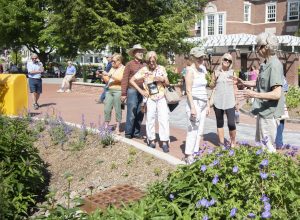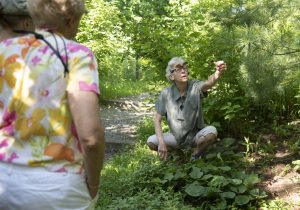
Not too long ago, there was a parking lot where Fletcher Music Hall now stands.
The area looks very different now. The modern-looking brown and copper-colored music hall is surrounded on all sides by gardens, a far cry from its pavement origins.
The design of the building and nearby gardens were part of an effort by Chautauqua Institution to be better stewards of the lake at the center of life and tourism in the county.
“When the potential seriousness of the problem in Chautauqua Lake was finally specified, the Institution, because it’s the largest privately-owned land area on Chautauqua Lake, realized they were in a position where they could really, potentially make a difference in the inputting of the nutrients into the lake,” Sara Baker Michalak said last Wednesday during a Bird, Tree & Garden Club tour of the Fletcher Music Hall gardens.
Through the installation of native plants and the specific grading of the land, the gardens were designed to catch and filter rainwater before it runs into Chautauqua Lake.
At 9:15 a.m. every Wednesday during the 2019 season, Baker Michalak leads a tour of the Fletcher Music Hall rain gardens, explaining how the area was constructed to reduce the runoff of nutrients like phosphorus and nitrogen which, in excess, cause the growth of algal blooms and unwanted aquatic plants in the lake.
Fletcher’s roof is mostly flat so it can collect water. Then, the water runs off the building from strategically placed notches in the roof and onto the gardens below.
“Fletcher Music Hall was designed to catch water,” Baker Michalak said. “The water runs off in sheets down into these bioswales and rain gardens that were all constructed to catch the water.”

A bioswale, which is a ditch filled with vegetation designed to catch and filter water, runs between the North Parking Lot and the back of Fletcher. This ditch catches any water running from the parking lot that may be contaminated with oil or chemicals, and directs it through a carefully planned system around the building.
There are a few artificial dams made out of rock in the bioswale that slow down the speed of the water that runs through the ditches. The water must reach a high enough volume to get over the obstacle before it can move on through the rest of the system.
“It’s a process of the water gathering and going, gathering and going,” Baker Michalak said.
The gardens around Fletcher are planted with a diverse collection of native plants, which are better suited to this environment than plants that are brought in from elsewhere.
“I’m promoting that we all start to think more about our gardens not being primarily eye candy of the biggest flower, the brightest color,” Baker Michalak said. “This is the new eye candy — the diversity of growth.”
Baker Michalak owned and operated Canadaway Wildflowers, a native plant nursery in Fredonia, where she lives. She is also an artist. Her series of artwork, ChautauquaNature, is inspired by native plants she finds in Chautauqua.
The introduction of environmentally conscious spaces like Fletcher Music Hall are an important step toward having a cleaner lake environment. Runoff from agricultural land and residential lawns often contain phosphorus and nitrogen, two nutrients that, while needed in balanced numbers, are found in Chautauqua Lake in excess amounts.
The presence of these two nutrients encourages the growth of algal blooms — some of which are toxic — and unwanted aquatic plants, which can get in the way of recreation.
Impervious surfaces like pavement and buildings cause stormwater runoff to go straight into the lake without much filtration. Rain gardens and bioswales like the ones at Fletcher can help to clean water runoff and slow the release of water into the lake.




